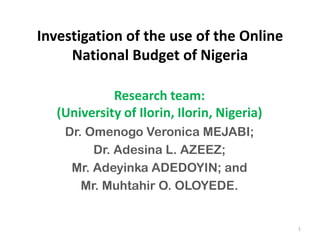ODDC Context - An Investigation of the use of the Online National Budget of Nigeria
- 1. Investigation of the use of the Online National Budget of Nigeria Research team: (University of Ilorin, Ilorin, Nigeria) Dr. Omenogo Veronica MEJABI; Dr. Adesina L. AZEEZ; Mr. Adeyinka ADEDOYIN; and Mr. Muhtahir O. OLOYEDE. 1
- 2. Case study focus • Focuses on Nigeria’s National budget data • Mainly government led on the supply side. • Data from Federal Government of Nigeria published through the website of the Budget Office of the Federation since 2007. http://www.budgetoffice.gov.ng 2
- 3. National Context • Nigeria is fraught with issues of corruption and bad governance • Citizens frustrated and distrustful of government promises • No existing government move towards open government data: no portals or open data initiative • But, many organisations do publish data relevant for governance on their websites: available to the public with no restrictions. • Public awareness of available data is unclear 3
- 4. The Data Sets involved • Budget of Nigeria available on the Budget Office website since 2007… • …but – not organised or structured. • Link descriptions vary from year to year (2007, 2008 and 2009) and it is not clear if the data is the final approved budget, or the budget as initially proposed to the National Assembly for consideration. • The 2011 budget has to be pieced together from the 2011 quarterly reports on budget implementation 4
- 7. Typical Budget Data (pdf, missing last column) 7
- 8. Typical Budget Data (hanging last column) 8
- 9. Data Set (continued) • Data files are published as PDF files • Vast improvement from the past when such data were only available as hard copies. • A user: may re-type the data into a spreadsheet the PDF files can be converted to spreadsheet files using readily available software converters such as PDF to Excel. 9
- 10. Research goals The study will attempt to determine: – how the public engage in the discussions of the national budget – review and assess newspaper coverage on the budget of Nigeria – degree of awareness of open data – its potential to drive good governance – identify the intermediaries in the flow of budget information • The study will also explore potential challenges to effective use of such open budget data. 10
- 11. Methodology A range of approaches, including: • Institutional survey – incl. respondents from the Budget Office and Ministry of Finance • Stakeholder survey – survey & in-depth interview: journalists, Key persons in NGOs, social networkers, professionals, visible budget analysts • Media analysis – newspapers (from 2009 – 2013) – online social networks (around the 2013 budget) • Trace of data from origin to end use – ODR mapping & visualisation tool 11
- 12. So far • Literature review to support the development and refinement of our data collection instruments • e.g. Newspaper analysis coding sheet. 12 Research Methods Issues • Software that would help us extract and analyze online social media discussions • Software to analyze content from the interviews. THANK YOU

